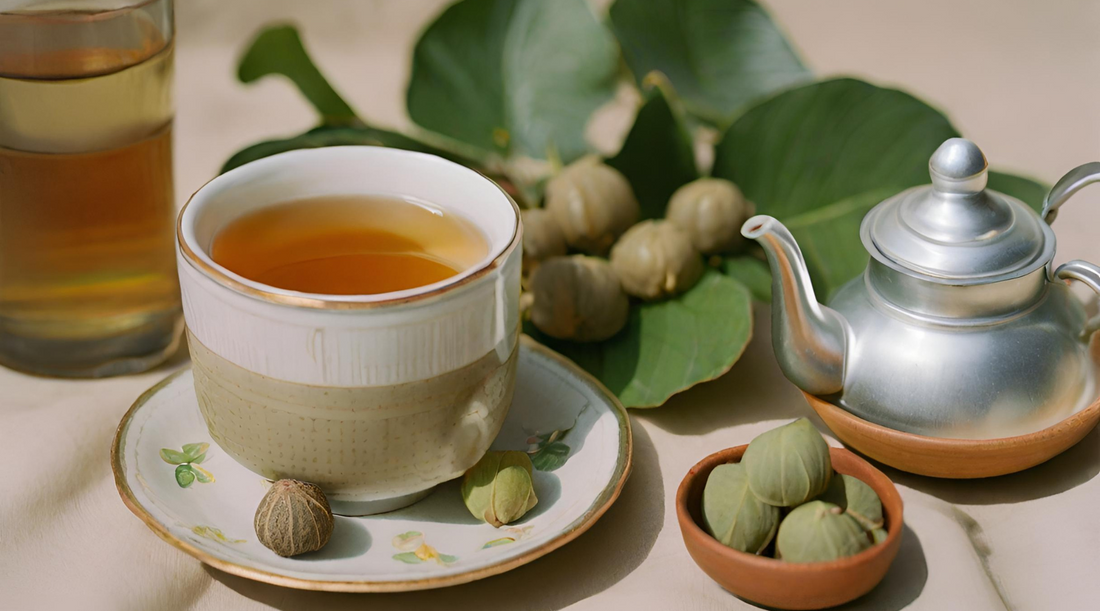The Complete Guide to Triphala: Unveiling the Ancient Wisdom and Modern Science of Ayurveda's Miracle Herb
Triphala, a revered herbal formula in Ayurvedic medicine, has a rich history that spans thousands of years. Its origins can be traced back to ancient India, where it was first documented and extensively used in traditional healing practices.
Triphala finds mention in several ancient Ayurvedic texts, including the Charaka Samhita and the Sushruta Samhita, which date back to around 1000 BCE to 500 CE. These texts are among the oldest and most comprehensive treatises on Ayurveda, providing detailed descriptions of medicinal herbs, formulations, and treatment modalities. In these classical Ayurvedic texts, Triphala is revered as a Tridoshic Rasayana, meaning it balances all three doshas (vata, pitta, and kapha) and promotes rejuvenation, longevity, and vitality. It is recommended for a wide range of health conditions, including digestive disorders, detoxification, immune support, and general well-being.
Triphala has been an integral part of traditional Indian medicine for millennia, where it has been used by Ayurvedic practitioners and herbalists for its diverse therapeutic properties. It was commonly prescribed as a general tonic, digestive aid, and rejuvenating remedy to promote overall health and wellness. Indigenous communities in India and neighboring regions also used Triphala for various medicinal purposes, incorporating it into their daily lives as a natural remedy for maintaining health and preventing disease.
Triphala holds cultural and spiritual significance in Indian subcontinent societies, where it is revered as a sacred herb with auspicious properties. It is often associated with longevity, purity, and holistic well-being, and is used in religious rituals, ceremonies, and Ayurvedic practices. The widespread use of Triphala in Indian culture reflects its deep-rooted presence in traditional medicine and its enduring legacy as a symbol of health and vitality.
Over time, Triphala's reputation and popularity spread beyond Indian subcontinent, gaining recognition in various parts of the world for its therapeutic benefits. It became a subject of interest among researchers, herbalists, and health enthusiasts seeking natural remedies for promoting health and wellness. Today, Triphala is widely available in the form of powders, capsules, tablets, and extracts in health stores, Ayurvedic pharmacies, and online platforms, catering to a global audience seeking the ancient wisdom of Ayurveda.
The three fruits that comprise Triphala—Amalaki (Emblica officinalis), Bibhitaki (Terminalia bellirica), and Haritaki (Terminalia chebula)—are native to the Indian subcontinent. They thrive in diverse climatic conditions, including tropical and subtropical regions, and are cultivated across India for their medicinal and nutritional value. These herbs grown in abundance on the island of Sri Lanka bordering native forest regions on virgin soil.
In this comprehensive guide, we embark on a journey to explore the rich history, traditional uses, and evidence-based health benefits of Triphala, shedding light on its profound healing potential and its relevance in modern wellness practices:
Health Benefits of Triphala – an evidence-based approach
Improving digestion with Triphala
Triphala promotes healthy digestion by stimulating digestive enzymes, enhancing nutrient absorption, and regulating bowel movements. Clinical studies have shown Triphala's efficacy in relieving constipation, improving gut health, and reducing symptoms of irritable bowel syndrome (IBS).
Triphala has been extensively studied for its digestive benefits in modern scientific research. Clinical trials have demonstrated its efficacy in relieving constipation, promoting regular bowel movements, and improving overall digestive function. Triphala's ability to stimulate digestive enzymes, regulate gut motility, and support gut microbiota balance makes it a valuable remedy for digestive disorders.
Antioxidant and anti-inflammatory effects of Triphala Tea
Triphala exhibits potent antioxidant properties, scavenging free radicals and protecting cells from oxidative damage. It also possesses anti-inflammatory properties, making it beneficial for reducing inflammation and preventing chronic diseases.
Triphala's potent antioxidant and anti-inflammatory properties have been well-documented in scientific studies. Research indicates that Triphala scavenges free radicals, reduces oxidative stress, and modulates inflammatory pathways, making it beneficial for combating chronic inflammation and oxidative damage associated with various diseases.
Boosting Immunity with Triphala Tea
Triphala supports immune function by enhancing white blood cell activity, boosting immune response, and protecting against infections. It strengthens the body's natural defenses and promotes overall immune health.
Modern research has explored Triphala's immunomodulatory effects, highlighting its ability to enhance immune function and strengthen the body's natural defenses. Triphala has been shown to stimulate the activity of immune cells, increase antibody production, and promote immune response against infections, making it a valuable adjunct in supporting overall immune health.
Térapy Ceylon ImmunTea Ayurvedic Tea infuses potent Triphala with other herbs such as Ginger, Kaladuru and Organic Green Tea to promote optimal health and vitality and promote a natural strong inner immunity.
Detoxing and Cleansing with Triphala Tea
Triphala acts as a gentle detoxifier, eliminating toxins and waste products from the body. It cleanses the colon, liver, and kidneys, promoting detoxification and purification of bodily systems. Triphala has demonstrated antimicrobial activity against a wide range of pathogens, including bacteria, viruses, and fungi. Research indicates that Triphala inhibits the growth of pathogenic microorganisms, prevents biofilm formation, and enhances the efficacy of conventional antimicrobial agents, suggesting its utility in combating infections and promoting antimicrobial stewardship
Promoting Cardiometabolic health with Triphala Tea
Triphala has shown promise in improving lipid profile, regulating blood sugar levels, and supporting cardiovascular health. It helps lower cholesterol, reduce blood pressure, and prevent metabolic disorders.
Studies have investigated Triphala's potential in managing cardiometabolic conditions such as diabetes, obesity, and cardiovascular disorders. Triphala has been found to improve lipid profile, regulate blood sugar levels, reduce blood pressure, and mitigate risk factors associated with metabolic syndrome, offering promising therapeutic implications for cardiovascular and metabolic health.
Glowing Skin and Hair growth with Triphala
Triphala's antioxidant and antimicrobial properties make it beneficial for promoting healthy skin and hair. It helps rejuvenate the skin, reduce acne, prevent premature aging, and strengthen hair follicles.
Triphala's antioxidant, antimicrobial, and anti-inflammatory properties make it beneficial for promoting skin and hair health. Modern research has explored Triphala's efficacy in treating skin conditions such as acne, eczema, and wound healing, as well as its potential in strengthening hair follicles, reducing hair fall, and enhancing hair growth, contributing to its use in skincare and haircare formulations.
Cognitive Health with Triphala
Emerging evidence suggests that Triphala may exert neuroprotective effects and support cognitive function. Studies have investigated Triphala's ability to enhance memory, improve cognitive performance, and protect against neurodegenerative diseases such as Alzheimer's and Parkinson's, highlighting its potential in promoting brain health and cognitive longevity
Triphala is indeed used in modern scientific remedies along with ancient ayurvedic scriptures and has garnered significant attention in the field of complementary and alternative medicine. Numerous scientific studies have investigated the pharmacological properties and potential health benefits of Triphala, leading to its integration into modern wellness practices. Overall, the integration of Triphala into modern scientific remedies underscores its versatility and therapeutic potential across various health conditions. As research continues to unveil the mechanisms of action and clinical applications of Triphala, it continues to gain recognition as a valuable herbal remedy in modern healthcare practices.
Triphala can be consumed in various forms, including powder, capsules, tablets, and liquid extracts. It is typically taken with warm water or milk before meals to enhance digestion and absorption. Daily doses of Triphala range from 1-3 grams for powder or 500-1000 mg for capsules, depending on individual health needs and doshic imbalances. Triphala can also be used externally for skin and hair care, as a mouthwash for oral hygiene, or as a natural eyewash for eye health.
One of the best ways to include Triphala to your day-to-day routine is to enjoy it as apart of your tea routine. Térapy Ceylon ImmunTea infuses this potent herb into a delicious cup of Ceylon Tea, which you can enjoy at home or on the go.
Triphala embodies the ancient wisdom of Ayurveda, offering a holistic approach to health and wellness that addresses the root causes of disease and imbalance. By harnessing the power of Triphala's three fruits—Amalaki, Bibhitaki, and Haritaki—we can unlock the secrets of longevity, vitality, and radiant health. As we embrace the timeless wisdom of Triphala and integrate it into our daily wellness practices, we embark on a journey of holistic healing, rejuvenation, and transformation.
Precautions and Considerations
While Triphala is generally safe for most people, it may interact with certain medications or health conditions. It is advisable to consult a healthcare professional before starting any new herbal supplement regimen. Pregnant and breastfeeding women, as well as individuals with underlying health conditions, should exercise caution and seek medical advice before using Triphala.


